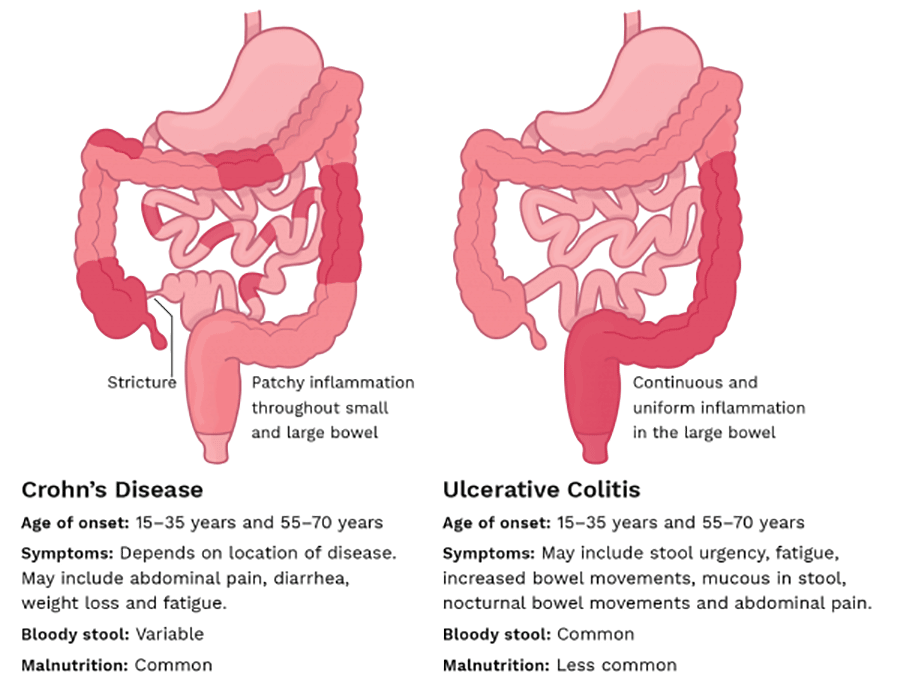Inflammatory Bowel Disease—Knowing the Basics
Inflammatory bowel disease (IBD) is a complicated chronic inflammatory disease that involves various genetic and environmental driving factors.[1]
Inflammatory bowel disease (IBD) is an umbrella term used to describe disorders that involve chronic inflammation of your digestive tract. Types of IBD include:

IBD can be debilitating and sometimes leads to life-threatening complications. Although its pathogenesis is poorly understood, an increasing number of studies have highlighted that dietary intake plays a key role in disease occurrence due to its underlying effects on gut microbiota, barrier function, and mucosal immunity.[2] For instance,
Video 1. The Best Diet for Crohn’s Disease Treatment (YouTube link)
Types of IBD?
Inflammatory bowel disease (IBD) is an umbrella term used to describe disorders that involve chronic inflammation of your digestive tract. Types of IBD include:
- Ulcerative colitis
- Which involves inflammation and sores (ulcers) along the superficial lining of your large intestine (colon) and rectum
- Crohn's disease
- Which is characterized by inflammation of the lining of your digestive tract, which often can involve the deeper layers of the digestive tract

Image via: AHealthBlog
Diets and IBD
- Westernized diet (WD)
- In [7], it shows the implications of the WD in the onset and progression of IBD
- WD is very different from the traditional diet of previous generations when the prevalence of IBD was considerably lower
- The most radical change has been the switch from a plant-based to an animal-sourced diet
- Another important change brought about by the Western diet is an overall higher calorie intake, especially from sugar, refined carbohydrates, animal proteins and ultra-processed foods.
- High-salt diet
- Can exacerbate intestinal inflammation by reducing Lactobacillus abundance and butyrate metabolism[3]
- High-fat diet
- Can contribute toward IBD progression by activating proinflammatory signaling and disrupting barrier systems[4]
- Ketogenic diet (KD)
- KD is characterized by high-fat and low-carbohydrate, is a dietary therapy that was initially used to treat drug-resistant epilepsy.[5]
- In a study, it has shown that KD significantly reduced inflammatory responses, protected intestinal barrier function, and reduced ILC3 production and the expression of related inflammatory cytokines (IL-17α, IL-18, IL-22, Ccl4), whereas the opposite effects were observed for the low-carbohydrate diet (LCD).[6]
More Readings
- Gut microbiota
- Barrier function
- Mucosal immunity
References
- Digby-Bell, J. L., Atreya, R., Monteleone, G. & Powell, N. Interrogating host immunity to predict treatment response in inflammatory bowel disease. Nat. Rev. Gastroenterol. Hepatol. 17, 9–20 (2020).
- Keshteli, A. H., Madsen, K. L. & Dieleman, L. A. Diet in the pathogenesis and management of ulcerative colitis; a review of randomized controlled dietary interventions. Nutrients 11, 1498 (2019).
- Miranda, P. M. et al. High salt diet exacerbates colitis in mice by decreasing Lactobacillus levels and butyrate production. Microbiome 6, 57 (2018).
- Rohr, M. W., Narasimhulu, C. A., Rudeski-Rohr, T. A. & Parthasarathy, S. Negative effects of a high-fat diet on intestinal permeability: a review. Adv. Nutr. 11, 77–91 (2020).
- Ulamek-Koziol, M., Czuczwar, S. J., Januszewski, S. & Pluta, R. Ketogenic diet and epilepsy. Nutrients 11, 2510 (2019).
- Ketogenic diet alleviates colitis by reduction of colonic group 3 innate lymphoid cells through altering gut microbiome
- Implications of the Westernized Diet in the Onset and Progression of IBD
- Diet and nutrition in the management of inflammatory bowel disease
- Walnuts may help protect against ulcerative colitis


Comments
Post a Comment